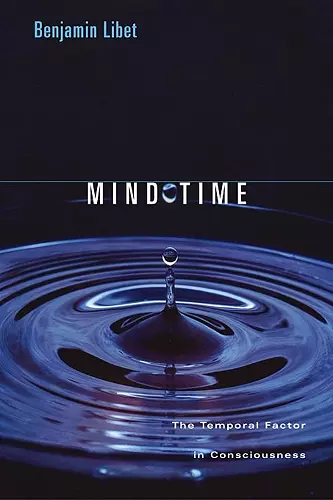Mind Time
The Temporal Factor in Consciousness
Format:Paperback
Publisher:Harvard University Press
Published:27th Nov '05
Currently unavailable, our supplier has not provided us a restock date

Mind Time makes for extremely interesting, engaging reading. Its discussions of consciousness, subjectivity, free will, and perception will intrigue anybody in philosophy or psychology interested in those topics. This is a valuable book to have available. -- David Rosenthal, Philosophy and Cognitive Science Graduate Center, City University of New York Benjamin Libet's discoveries are of extraordinary interest. His is almost the only approach yet to yield any credible evidence of how conscious awareness is produced by the brain. Mind Time endeavors to clarify these startling observations for the general public, set them in proper framework of neuroscientific knowledge, and probe their philosophical meaning. Libet's work is unique, and speaks to questions asked by all humankind. -- Robert W. Doty, PhD, Professor of Neurobiology and Anatomy, University of Rochester This book is strikingly different from most of the other books on consciousness in one key respect: it focuses on empirical discoveries, not speculation or argument. -- From the Foreword by Stephen Kosslyn
Over a long and distinguished career Libet has conducted experiments that have helped us see, in clear and concrete ways, how the brain produces conscious awareness. For the first time, Libet gives his own account of these experiments and their importance to our understanding of consciousness.
Our subjective inner life is what really matters to us as human beings--and yet we know relatively little about how it arises. Over a long and distinguished career Benjamin Libet has conducted experiments that have helped us see, in clear and concrete ways, how the brain produces conscious awareness. For the first time, Libet gives his own account of these experiments and their importance for our understanding of consciousness.
Most notably, Libet's experiments reveal a substantial delay--the "mind time" of the title--before any awareness affects how we view our mental activities. If all conscious awarenesses are preceded by unconscious processes, as Libet observes, we are forced to conclude that unconscious processes initiate our conscious experiences. Freely voluntary acts are found to be initiated unconsciously before an awareness of wanting to act--a discovery with profound ramifications for our understanding of free will.
How do the physical activities of billions of cerebral nerve cells give rise to an integrated conscious subjective awareness? How can the subjective mind affect or control voluntary actions? Libet considers these questions, as well as the implications of his discoveries for the nature of the soul, the identity of the person, and the relation of the non-physical subjective mind to the physical brain that produces it. Rendered in clear, accessible language, Libet's experiments and theories will allow interested amateurs and experts alike to share the experience of the extraordinary discoveries made in the practical study of consciousness.
Mind Time makes for extremely interesting, engaging reading. Its discussions of consciousness, subjectivity, free will, and perception will intrigue anybody in philosophy or psychology interested in those topics. This is a valuable book to have available. -- David Rosenthal, Philosophy and Cognitive Science Graduate Center, City University of New York
Benjamin Libet's discoveries are of extraordinary interest. His is almost the only approach yet to yield any credible evidence of how conscious awareness is produced by the brain. Mind Time endeavors to clarify these startling observations for the general public, set them in proper framework of neuroscientific knowledge, and probe their philosophical meaning. Libet's work is unique, and speaks to questions asked by all humankind. -- Robert W. Doty, PhD, Professor of Neurobiology and Anatomy, University of Rochester
This book is strikingly different from most of the other books on consciousness in one key respect: it focuses on empirical discoveries, not speculation or argument. -- From the Foreword by Stephen Kosslyn
Libet only dared switch to the study of consciousness after he got tenure. It is fortunate for us that he did, and that he has presented us here with what amounts to a retrospective exhibition of his work...The refreshing result is that we are immediately engaged in an earnest one-to-one tutorial with [him]...In [his] work, philosophers have found grist for what they do best. Indeed, his experiments...must rank as one of the major contributions of experimental psychology to modern philosophy of mind...[W]hether or not one agrees with his thesis or not, one must acknowledge that his pioneering experimental work has certainly been stimulating. -- Kevan Martin * Nature *
What makes Benjamin Libet different from all the others writing on [consciousness]...is that he has actually spent the past 40 years experimenting on the topic. His findings have played a central role in others' speculations. Now he has put his life's work into a single short book. -- Steven Rose * New Scientist *
[Libet's] book is greatly to be welcomed because it provides the first full and detailed account of his famous experiments, explaining how and why he carried them out, and how he came to his conclusions...What is new is Libet's 'conscious mental field theory,' which is startlingly different from any other current theory of consciousness. -- Susan Blackmore * Times Higher Education Supplement *
- Nominated for Pulitzer Prizes 2005
ISBN: 9780674018464
Dimensions: 210mm x 140mm x 19mm
Weight: unknown
272 pages